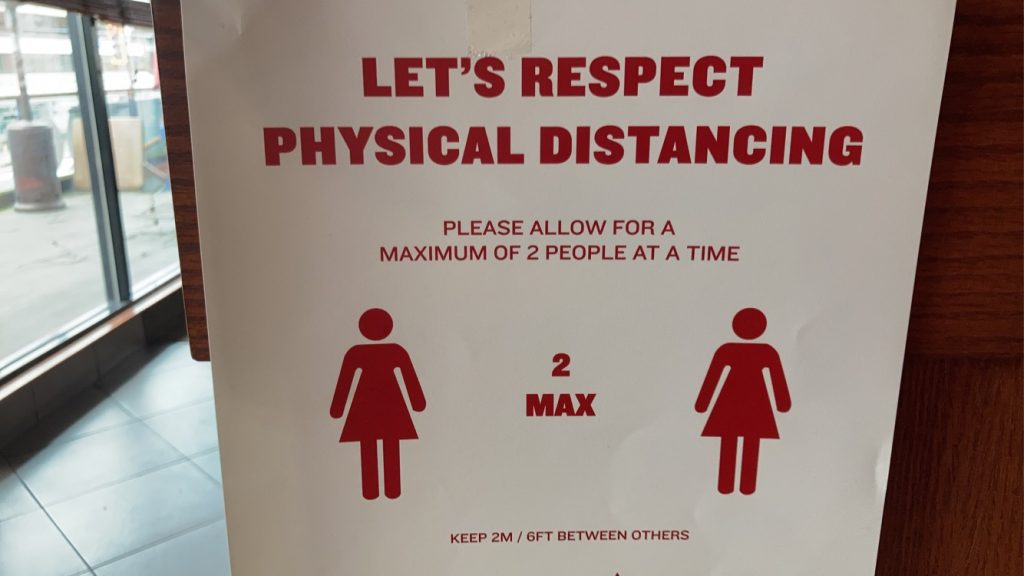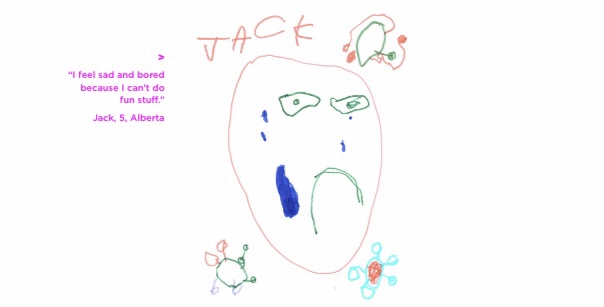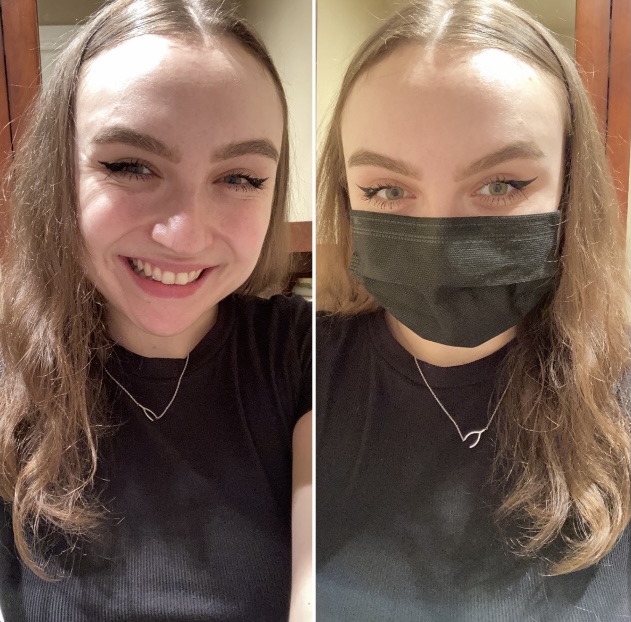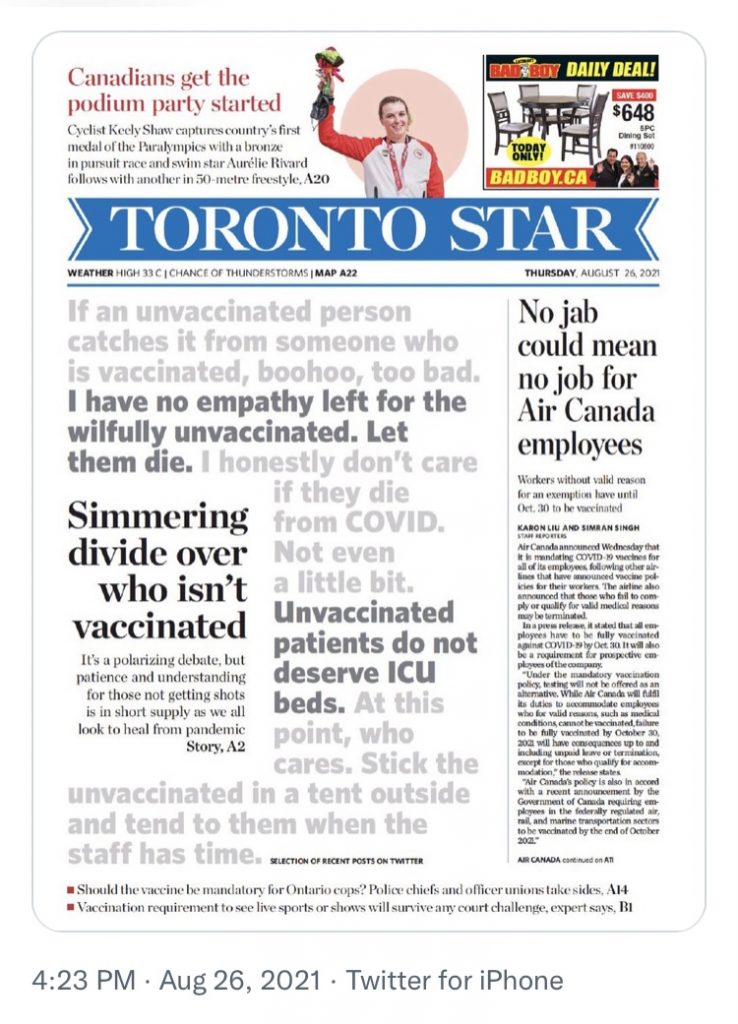
Jamie Ward
Jamie is currently completing her Bachelor of Arts with a major in interdisciplinary studies here at Capilano University. Recently, she has also received her Associate of Arts degree. Going forward, Jamie hopes to complete a master’s degree and pursue a career in clinical counselling.

For over two years now the covid-19 crisis has plagued every aspect of everyone’s lives. This has been a trying time and all of us have struggled in our own unique ways. However, it is our future generations, our children, who will really have to pay the price. As a direct consequence ofthecovid-19 pandemic and the measures that were put in place to protect us from it, rates of childhood depression and anxiety, as well as cases of suicide and abuse have all surged (Aziz, 2021). When speaking of these grave issues that our children have had to face, it is very necessary to note that their suffering could have all been easily avoided had we not become threatened by their sheer existence. Masking, social distancing and school closures, vaccines, and the isolation that came with these events were meant to protect our children, and in turn us. This has not been the case.
I argue that it was not necessary to enact such strict and traumatizing rules for our children as while they may catch covid-19 at a similar rate to adults (Mayo Clinic, 2022) the mortality rate rests at less than 0.4% for all children worldwide (Unicef, 2022). For context, Children First Canada (2021) reports that unintentional and avoidable injuries remain the biggest threat to our children, along with suicides, which continue to climb at an extremely unsettling rate. In 2021, CTV News reported that Wolfson Children’s Hospital in Florida had admission rates four times higher than in the year 2019 for children in crisis, while Dayton Children’s Hospital in Ohio saw a thirty percent increase in admissions to their mental health unit since the year 2020 (Tanner, 2021). So, while we may have managed to protect a huge majority of our children from the consequences of covid-19, we exposed them all to far more dangerous and serious threats than the virus itself and have affected their ability to develop and lead healthy lives in a manner that will likely loom over them for the rest of their lives. “This is a critical time. When we talk about children and youth being the future of our societies, this couldn’t be more real or truthful…If youth grow through this pandemic with increasing levels of stress and mental health challenges, society could be in for some real challenges as youth age into adulthood” (Molano, 2020).
I have been exposed to the troubling effects of mental health challenges for as long as I can remember. My older sister and I have grown up seeing what mental illness can do to a person and those around them, especially if left untreated. As mental illness is not as well known and does not receive the same attention as physical illnesses, this can happen very easily, especially if the signs are overlooked in childhood, which is the most crucial period of a person’s development. In my childhood I was lucky enough to receive supports for my mental health as I developed and learned more about myself and the world. However, I still don’t think that it made mine or my sister’s struggle with mental illness that much easier either. Our father has bipolar disorder but for the longest time we were told that he was just very depressed. He was given so many various medications, but nothing ever seemed to do the trick. This was still somewhat manageable until we were exposed to what differentiates depressive disorder from bipolar disorder: Manic depression. When my father started having manic episodes while I was growing up, I don’t think I have ever been more confused or scared. As a child, I could not understand how someone I knew so well and relied on so much, could suddenly just be a different person, a person I did not understand at all. I think that’s what makes mental health so important, but also so difficult, that no one, not even trained professionals, can fully grasp what is going on inside someone else’s brain, and more importantly, why.

Children First Canada (2021). Raising Canada.
CFC-RC-Report-2021_Final.pdf (childrenfirstcanada.org)
The way in which a child is raised and what the child is exposed to in these crucial times of growth greatly affects their development and in turn their future. Psychological development refers to the physical, social, emotional, and cognitive development that begins in childhood and carries on throughout the lifespan. (Cherry, 2021). The study of psychological development in all stages of life helps to create an understanding of typical growth patterns and how to best assist those with certain aspects of their development as needed to create a healthy and happy future. There are many circumstances which may affect one’s ability to develop and grow properly. Traumatic experiences such as abuse, loss, bullying, sicknesses, and neglect are all detrimental to a child’s growth as they do not yet have the abilities to cope and make sense of such frightening situations (Zarrabi, 2020).Therefore, nurturing, and safe environments are so important for children as without them they may be exposed to things that no person should ever have to endure. “Children’s developmental maturation is a biological and psychological narrative written partly in their endowment, partly in their experiences, and partly in their parents’ own developmental backgrounds” (Mayes & Lassonde, 2014).
Jean Piaget’s theory of cognitive development has been one of the most influential pieces of work when it comes to understanding how children grow and prosper in their lives. Piaget’s theory consists of four developmental stages known as: The sensorimotor stage, which is from birth to two years of age, the preoperational stage of two to seven years, the concrete operational stage, which is seven to eleven years, and finally, the formal operational stage for ages twelve and up. These stages propose that the child is developing and using different forms of intelligence as they grow (McLeod, 2018). Each stage is essential to the child’s future as it helps them make sense of the ever-changing world around them. I believe that the covid-19 pandemic has the ability to be a great influence on these critical learning stages as there has been so much confusion and isolation for two whole years, which in a young child’s life, that could be most of it.
Throughout the majority of the covid-19 pandemic I have worked as a server in a restaurant. There have been many different precautions that we have had to follow throughout this time in order to stay open, with an obvious one being the wearing of masks or face coverings. It was definitely an adjustment. However, it was one we were happy to make to continue to serve our guests safely. Communication, to be expected, became much more difficult with these guests and with each other as we couldn’t always make out what was being said behind the fabrics. Of course, we all tried our best and adjusted to these few difficulties. But, I can only imagine how much harder it must have been for these younger children who are still developing these essential communication skills to speak with people who are wearing a mask or to speak for themselves with their own mask on.
Annette, a preschool instructor, thinks that covid-19 measures such as face coverings have been very helpful in keeping themselves and their students safe. However, there have been barriers here too, “It’s a big change. Usually the children, they look at your facial expressions and you know, your mouth, your lips, to learn how to speak? So, anything you say, there’s just this whole part of learning that is sort of missing.” This can have a huge impact on the development of children and cause a fearful delay in the acquisition of necessary communication skills. In turn, this can also disrupt the child’s confidence and ability to perform in social interactions as they grow up. “Being able to use others’ verbal or facial cues to figure out how someone is feeling or pick up on safe or dangerous aspects of environments and people is a critical task for young kids” (Rogers, 2021). Masks have been very harmful to the learning environment as children, depending on their age, have been forced to sit in the classroom with one all day long. According to Annette, many young children are also sent with one by their parents or choose to wear one themselves. Masks have been helpful in that they protect us and each other from the virus, but they have not been helpful for the development of our future generation. Communication is interrupted by these masks and facial expressions can not be properly read or recognized. These are the times where children need to be learning language development and it just is not nearly as effective if they cannot see the words and the emotions for themselves.

Next, I would like to continue on and discuss the effects of social distancing and shutdowns on children’s wellbeing. I believe that these measures have been the most damaging to not only children’s lives, but adult’s lives too, based on the extreme isolation and loneliness that these measures called for. People, especially children, thrive when they have stability and a routine (Molano, 2021).The covid-19 crisis took this all away. Suddenly, schools were closed, and regular activities ceased to exist. During this very stressful and confusing time, both mental and physical health and development have had the opportunity to drastically deteriorate. It has been reported that depression and anxiety rates in children are soaring due to missing out on their usual activities, and in return are spending more time indoors and on screens, which is a concerning trend for our future (Araújoet al, 2020). Additionally, rates of eating disorders are climbing, along with rates of suicide and abuse due to the downsides of having the whole family at home (Children First Canada, 2021). So, I wonder why we have punished not only ourselves, but our children in such a damaging and disturbing way?
After spending so much time isolated and alone, it seems almost easier for me to continue on like this. I don’t think that I am the only one who feels like they barely even know how to interact in the real world anymore and receives much anxiety from trying. When the covid-19 crisis first hit and we were sent home from school, all of my current plans, hopes, and dreams felt like they were being sent away too. Back then, when we were first hit with news of a pandemic, I was looking forward to graduating from my studies at Capilano University and moving forward to an exciting year of travel and self-discovery before finding myself a new, promising job and working hard some more. Instead, here I am two years later still slowly chipping away at my degree and serving tables at a local restaurant. I still have not yet managed to leave the country, let alone the province, and I hardly ever see my closest friends and the people most important to me in my life.
Recently, I also started receiving an uncomfortable number of comments about my weight. Without trying to, or even noticing, I learned that I lost about twenty-five pounds. The last time that I weighed this little was probably about ten years ago now. I was sitting at a healthy weight before, and it’s not that I’m unhealthy now, it’s just that I don’t quite understand my own body anymore. Without having a proper, set routine, I became quite unmotivated to do anything that I didn’t really have to do. I stayed up later, slept in more, and soon was skipping meals because they didn’t really feel necessary anymore. Before I knew it, whenever my friends, family, or coworkers did see me, they were shocked at my new appearance, and I couldn’t understand why. This has been emotionally tolling for me, as when people are trying to be kind to me with comments like, “you lost so much weight!” or “you look so skinny!” all I can think is “what was wrong with me before?” I know that there is never any ill intent behind these comments, but they hurt me every time I hear them as they remind me that on top of everything, I don’t even understand my own body anymore.
It is only harder for our children though. Children are so used to spending a large amount of their time at school and have important relationships with their peers and instructors. School shutdowns created an environment where learning was no longer a priority and caused children to slip through the cracks. Children’s mental health has suffered because they have lost so much control of their own lives. They cannot do the fun things that they are used to and are instead becoming even more sedentary and screen reliant. Children are socializing less with each other due to fears of the infection and therefore receive far less physical activity which can in turn lead to disordered eating. Parents have obviously been doing the best that they can, but this is not something they have been prepared for either. In some households, parents were essential workers and were home even less now, and in others, parents might both be working from home while also trying to school their children from home. Each family’s story has been unique to their personal situations, but overall, there is a clear trend of increased hardships at home as everyone does their best to adjust to what has been called the “new normal.”
Throughout the pandemic, many families faced economic hardships and this stress in addition with the stress from the sickness, has created unstable homes and strained relationships (Lawson et al, 2020). For a frightening example, Global News reports that since September of 2020, double the number of infants have been seen regarding maltreatment at the Children’s Hospital of Eastern Ontario(Aziz, 2021). Additionally, the Kids Help Phone, a free and confidential counselling service, saw a 350% increase in usage and has continued to be a resource with very high demand during the pandemic (Kelland,2020). It is quite clear that our children have been suffering, and I disagree that the end of the pandemic will solve any of these serious issues. What happens in a child’s life sticks with them, especially something of this magnitude, and now it is time to face the consequences of our rules that were made in fear and help the children who are actually living in it.
Co-occurring with these drastic levels of abuse are also the mental health struggles of both children and their parents, as well as another concerning uptick in eating disorders, suicidal thoughts, and suicide. These frightening events go hand and hand with the psychological and physical abuse discussed above as a result of pandemic isolation. The confusion and stress, the tense home life, the lack of routine, and the lack of outside relationships is causing more and more children to seek help for their wellbeing(Wilford, 2021). Instructors like Annette are doing their best to quell these hardships that their beloved students have to face, but when their school is forced to shut down, they too only have so many options. Annette shared with me how her and her coworkers used this time to get as creative as possible to find solutions for these difficult times: The first way was to create YouTube videos for the kids to watch while they were at home. Annette says this was helpful for the children because they could still at least see their teachers and look forward to when the next entertaining and educational video would be posted for them. The next way was to add a large focus to outdoor learning when they could be with their students. They invested in outdoor furniture such as gazebos so that the children could be protected from the elements and still get their exercise and education in. Annette explained that when they played with the children outside, they could also remove their masks, which allowed the children to have some real face-to-face time as well as fresh air. I believe that Annette’s tactics were a very good, helpful step in creating a safe and fun learning environment for the children in the best way she knew how. Ensuring the children get the exercise they need is essential for not only their physical health, but their mental health too.

us to get vaccinated.
The final traumatic event relating to the covid-19 pandemic that I would like to discuss is the rollout of vaccinations and the implementations of their mandates. Early on, I made the personal decision for myself that I was not going to receive a covid-19 vaccination. Upon heavily debating the issue for a long while, I felt that I was making the correct choice for myself. I did not let pressure from my family, friends, work, school, or the government mandates sway my decision once I made it. I still stand by my choice. The thing is, by making this choice, one that I consider to be deeply personal, it has somehow made me into less of a person than those who made the opposite choice of me. Everywhere I go I hear about how people like me are sick, both mentally and physically, due to this choice that we have made. Do you know how damaging that is for a person, let alone a child?
The Toronto Star, which is one of Canada’s largest newspapers, released on august 26, 2021, a front page full of abusive comments made about unvaccinated people that they retrieved from twitter and paired with their stories on the matter that day. One of the tweets on the front page reads, “I have no empathy left for the wilfully unvaccinated. Let them die.” It is followed by another one saying, “I honestly don’t care if they die from COVID. Not even a little bit.” And after that, we have,“ Unvaccinated patients do not deserve ICU beds.” What exactly happened to us as a society these last two years for people to think that this is okay? How can people wish death upon their neighbours, solely for making a different medical decision than them? And most importantly, why does our media and our government condone such hateful and disturbing rhetoric?
It has been humiliating and degrading to be an unvaccinated citizen here in Canada. My friends invite me to join them for dinner, events, and vacations, only for them to realize the error of their ways and awkwardly revoke the invitation. My coworkers go out after our shifts and don’t understand why I won’t join them. My school emails me time and time again reminding me to tell them if I am vaccinated or not and I do nothing because I am scared that I will be segregated and shunned. And my fears were not unwarranted either. The B.C vaccine card essentially prevented me and others like me from accessing regular services that the other students could. We were not aloud in housing, in the gym, or at any school events. I would go to class and then go home, continuing the streak of isolation and embarrassment. What I found to be the most ridiculous part of it all though, was that while I was practically ousted from society, I could still serve the society. Throughout the entire seven months that I have been unable to enter certain public places such as restaurants, pubs, and gyms, I have been able to work in one. There were never any rules in place about the workers and the vaccine card here in B.C, only the patrons. Therefore, I was able to go to work everyday, check the customer’s B.C vaccine cards, and serve them, regardless of being unvaccinated myself. Once again, a completely humiliating experience as people have become so comfortable in using unvaccinated people as scapegoats for their blame and anger. I listen and smile as people talk about how disgusting unvaccinated people are, and I worry for our future.
The reason this is relevant is because I know I am not the only one. There are families out there who have chosen not to vaccinate their children and there are children out there who have chosen for themselves not to receive one. I want people to imagine what it must belike for these young kids to all of a sudden become less than due to their family’s beliefs and choices. It is certainly not okay. Children and adults alike are being terribly bullied just because of something as meaningless as a vaccination status. The future consequences of telling a whole group of people, especially developing young children and youth, that they are something to be feared, will be massive.

Photo retrieved from twitter.
Levant, E. [@ezralevant]. (2021, August 26). Front page of Canada’s largest newspaper@TorontoStar[Tweet].Twitter.
https://mobile.twitter.com/ezralevant/status/1431034719693574144
Overall, I think that we will be stuck with the psychological scars from this pandemic long after it subsides. Due to the loss of our regular routines, children and adults alike have suffered from ever-increasing stress levels. Additionally, social interactions will also continue to suffer. Even after the pandemic has eased, socialization will never be the same. There are now many children who grew up without ever being exposed to regular human interaction, and even many adults are now out of practice. I imagine that social anxiety will be a huge barrier for many of us as we try to reclaim our lives and our futures.
Masks, social distancing, lockdowns, and vaccinations may have been necessary to get us through this pandemic, but now, it is far more necessary to get our children back out and enjoying their young lives. For some, being home for some extra time may have been a fun treat. For others, it has been an unsettling and dangerous experience, both psychologically and physically. The children are our future, and if they suffer, we all will. The psychological health and development of our children must become a priority as we move on from the covid-19 crisis. We must never again forget the importance of all aspects of a child’s health, we cannot just ignore something as critical as mental health because of a threat to our physical health. Our children deserve better.
Works Cited
Araújo, L. A. D., Veloso, C. F., Souza, M. D. C., Azevedo, J. M. C. D., & Tarro, G. (2020). The potential impact of the covid-19 pandemic on child growth and development: A systematic review. Jornal de Pediatria, 97(4), 369-377.doi: 10.1016/j.jped.2020.08.008
Aziz, S. (2021, September 1). Child abuse, suicide attempts in Canada rose during covid-19 pandemic: report. Global News.
https://globalnews.ca/news/8157443/covid-children-abuse-suicide-canada-report/
Cherry, K. (2021, April17). Developmental psychology. Verywell Mind. https://www.verywellmind.com/developmental-psychology-4157180
Children First Canada. (2021). Raising Canada. CFC-RC-Report-2021_Final.pdf (childrenfirstcanada.org)
Kelland, A. (2020, June 17). Dramatic spike in calls to kids help phone in N.L. during pandemic. CBC News.https://www.cbc.ca/news/canada/newfoundland-labrador/kids-help-phone-nl-increase-covid-19-1.5612405
Lawson, M., Piel, M. H., & Simon, M. (2020). Child maltreatment during the covid-19pandemic:Consequences of parental job loss on psychological and physical abuse towards children. Child Abuse and Neglect, 110(2).
doi: 10.1016/j.chiabu.2020.104709
Levant, E. [@ezralevant]. (2021, August 26). Front page of Canada’s largest newspaper @TorontoStar[Tweet]. Twitter.https://mobile.twitter.com/ezralevant/status/1431034719693574144
Mayes, L. C., & Lassonde, S. (2014). A girl’s childhood: Psychological development, social change, and the yale child study center. Yale University Press.
https://www-jstor-org.ezproxy.capilanou.ca/stable/j.ctt1bh4bj5
MayoClinic. (2022). Covid-19 in Babies and Children. https://www.mayoclinic.org/diseases-conditions/coronavirus/in-depth/coronavirus-in-babies-and-children/art-20484405
McLeod, S.(2018, June 6). Piaget’s stages of cognitive development. Simply Psychology. www.simplypsychology.org/piaget.html
Molano, S. (2021, August 10). Youth depression and anxiety doubled during the pandemic, new analysis finds. CNN.
https://www.cnn.com/2021/08/10/health/covid-child-teen-depression-anxiety-wellness/index.html
Parrillo, F. (2020, December 14). Few children, teens diagnosed with covid-19, but many suffering emotionally, mentally: study. Global News.
https://globalnews.ca/news/7521351/children-teens-coronavirus-mental-health-study/
Rogers, K. (2021, August 11). Does mask wearing harm your child’s development? Experts weigh in. CNN.
https://www.cnn.com/2021/08/11/health/masks-child-development-effects-covid-pandemic-wellness/index.html
Tanner, L. (2021, June 29). Suicidal crises, mental fatigue: kids struggle after pandemic isolation. CTV News.
https://www.ctvnews.ca/health/coronavirus/suicidal-crises-mental-fatigue-kids-struggle-after-pandemic-isolation-1.5489891
Unicef. (2022). Child Mortality and Covid-19.
https://data.unicef.org/topic/child-survival/covid-19/
Wilford, D. (2021, September 1). Child abuse, youth suicide rates, rose significantly during pandemic: Report. Toronto Sun.
https://torontosun.com/news/national/child-abuse-youth-suicide-rates-rose-significantly-during-pandemic-report
Zarrabi, G. (2020, June 14). The impacts of trauma on child development. Harbor Psychiatry and Mental Health.
https://harbormentalhealth.com/2020/06/14/the-impacts-of-trauma-onchilddevelopment/#:~:text=Traumatic%20experiences%20are%20common%20in%20childhood%20and%20adolescence,positively%20or%20negatively%20depending%20on%20responses%20and%20interventions.